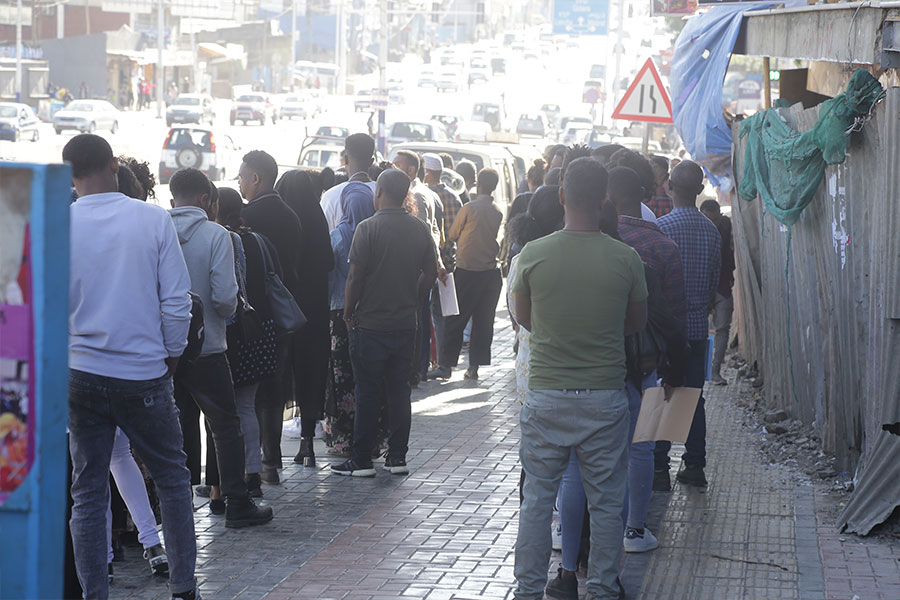
Sunday with Eden | Jan 01,2022
May 31 , 2020
By Christian Tesfaye
If there is a social media page that has everyone’s attention these days, it belongs to Lia Tadesse (MD), minister of Health. Appointed to the position in the middle of what is perhaps the most challenging of times for public health, she has performed her job as well as anyone presented with weak health infrastructure and few professionals could.
Throughout the pandemic, her messaging has been clear, her outlook has been positive, and she has held her head up high even as politics and the usual social media outrage machine has been working in overdrive. She deserves all the support she can get.
Unfortunately, the situation has become dire in Ethiopia. Just when we thought we were in the clear, the pandemic has given us reason to pause. At first, it seemed that the pandemic would barely affect Africa. The first two months did not result in an exponential increase, but the virus is now spreading steadily.
It is not clear if the number of cases is going to explode after this. But the data is interesting.
Take last Thursday, for example. One hundred cases were reported, the highest number the nation has reported in a day. It was well over 10pc of the total, which was then at 831. This was after testing almost 5,000 people a day and a total of 100,000 individuals. If that number was not way below the number of people that need to be tested to draw a meaningful conclusion about the reach of the virus, the number of tests conducted thus far would be impressive. It was about a third higher than the number of people Kenya had tested, although that country has twice Ethiopia’s population.
What is interesting is that the number of patients in intensive care remains extremely low. There was just one by Thusrday, well below what has been witnessed in other countries. The nation also seems to be bucking the trend of the two to four percent case fatality rate of COVID-19. Seven individuals have sadly passed away as a result of contracting the virus. This means, as of Thursday, the virus has a 0.8pc mortality rate here.
There is also another interesting detail, and it has to do with the nature of a purported community spread. Early high case mortality rates are usually attributed to, in the absence of an elderly population, an undetected but broad spread of the virus. Ethiopia has not suffered a high fatality rate. Whenever this has happened, it has been attributed to large numbers of asymptomatic cases. Only widespread and random testing, including antibody tests, can prove this is the case though.
Testing is all the more important since the number of COVID-19 victims without proven contact with people that have a travel history or a person with the virus have increased. Some of these individuals have died without being detected. A case in point was the 70-year-old resident of Addis Abeba, who went to a hospital to be treated for a different health condition. She was randomly treated at the hospital and was found to have COVID-19. By the time her results had come back, she had passed away. Earlier in the week, another person had died in a similar manner.
Both of them were detected randomly. This shows that there could be the sort of spread across at least Addis Abeba that should worry many people. It could also be used to show that the disease is not as infectious and fatal in the country – perhaps due to the proportion of young people in the population – as was first assumed.
The point is that no one really knows. Not yet. Anyone who claims to understand the state of the spread of the virus is lying. There is not much known about the nature of the virus, and there is not much data collected in Ethiopia to make any conclusions about how far it has spread in the country. This is why, even today, it is better to err on the side of caution and practice the preventive measures the health professionals are suggesting. The best policy for combating what we do not know is to be extra careful until we figure out what is going on.
PUBLISHED ON
May 31,2020 [ VOL
21 , NO
1049]


Sunday with Eden | Jan 01,2022

Commentaries | Mar 27,2021

Commentaries | Jan 05,2019

Viewpoints | Jun 05,2021

Verbatim | Oct 01,2022

Fortune News | May 18,2024

Radar | Jun 29,2019

Viewpoints | Nov 06,2021

Agenda | Jan 14,2023

Radar | May 18,2019

Photo Gallery | 171920 Views | May 06,2019

Photo Gallery | 162156 Views | Apr 26,2019

Photo Gallery | 151915 Views | Oct 06,2021

My Opinion | 136329 Views | Aug 14,2021





Dec 22 , 2024 . By TIZITA SHEWAFERAW
Charged with transforming colossal state-owned enterprises into modern and competitiv...

Aug 18 , 2024 . By AKSAH ITALO
Although predictable Yonas Zerihun's job in the ride-hailing service is not immune to...

Jul 28 , 2024 . By TIZITA SHEWAFERAW
Unhabitual, perhaps too many, Samuel Gebreyohannes, 38, used to occasionally enjoy a couple of beers at breakfast. However, he recently swit...

Jul 13 , 2024 . By AKSAH ITALO
Investors who rely on tractors, trucks, and field vehicles for commuting, transporting commodities, and f...

Oct 4 , 2025
Eyob Tekalegn (PhD) had been in the Governor's chair for only weeks when, on Septembe...

Sep 27 , 2025
Four years into an experiment with “shock therapy” in education, the national moo...

Sep 20 , 2025
Getachew Reda's return to the national stage was always going to stir attention. Once...

Sep 13 , 2025
At its launch in Nairobi two years ago, the Africa Climate Summit was billed as the f...

Oct 5 , 2025 . By NAHOM AYELE
In Meqelle, a name long associated with industrial grit and regional pride is undergo...

Oct 5 , 2025 . By BEZAWIT HULUAGER
The federal government is set to roll out a new "motor vehicle circulation tax" in th...

Oct 5 , 2025 . By NAHOM AYELE
The Bank of Abyssinia is wrestling with the loss of a prime plot of land once leased...

Oct 5 , 2025 . By BEZAWIT HULUAGER
The Customs Commission has introduced new tariffs on a wide range of imported goods i...